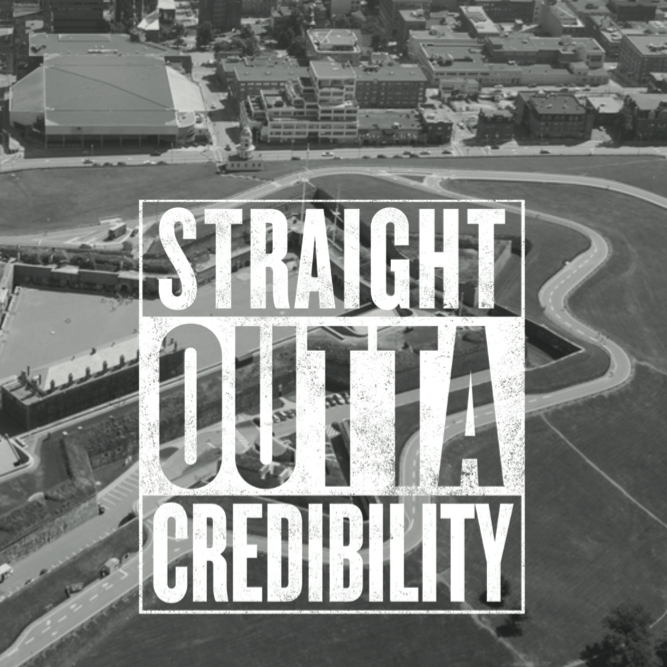
A little over a week ago, the CBC posted an article on their website detailing one woman’s harrowing account of life on the streets of the drug-mecca that is the South End. The article states that South Street is “practically in the crossfire of a drug war,” that the neighborhood and its families are in danger and that the parents who drop their children off at the local daycare and nursery would be “horrified” to know the ugly truth.
Ahh, fear-mongering. It’s a time-honored tradition in the media, and in our society. It’s been with us since the first caveman shaman realized he could scare up a few extra slabs of mammoth meat if he convinced his clan that angry spirits demanded offerings. Really, I can’t fully fault the CBC for this article – the content practically presented itself on a silver platter. Two young men, privileged and white, allegedly get caught up in the drug game, and one tragically dies at the hand of the other. All of this, taking place on the campus of one of the most expensive universities in the country and in a neighborhood filled with million-dollar properties.
(Before I continue, I want to say that in no way am I making light of Taylor Samson’s murder; it’s devastating and tragic. The pain his family and friends are going through is unfathomable and my thoughts and sympathies are with them.)
An article like that will generate hits for the CBC, especially from concerned parents who are about to send their children to Dalhousie. Looking at this particular article next to their other stories about the Samson case though, it sticks out like a sore thumb. It wasn’t a necessary piece of journalism providing valuable update on the state of the investigation – it was hysteria-stoking clickbait.
I’m trying not to make too much fun of the anonymous woman in the article, for she, or at least someone claiming to be her, made a post on Reddit stating that she had been misquoted and that they had left a lot of her comments out of the article. However, if she did say that South Street is caught in the crossfire of a drug war, then she probably hasn’t been that exposed to a neighborhood riddled with drug problems. Whether she has or not, the CBC definitely knows the difference.
I’ve lived on South Street for a few years now; the alleged murder scene is about a minute-and-a-half walk from my front door. I’m not at all worried about living here, and I’m one of the most careful, suspicious people you will ever meet. It’s just that I have lived in areas that really have have been seriously shaped by drugs in very unfortunate ways. When I was growing up, I would wake up in the middle of the night to the police dragging people out of the nearby crackhouse. I would later see some of those people get into brawls in the middle of the day when I was coming home from school; I remember them brutalizing each other as needles flew out of their jacket pockets in a way that would have been almost cartoonish if it wasn’t so disturbing.
I went to sleepovers at my best friend’s house every weekend – she lived in one of the absolute worst areas in the city, a neighbourhood that made my street look like a quiet, immaculate suburb by comparison. When we were twelve, as we swung on swings outside of her house, we heard gunshots nearby. We just shrugged and went inside. We were so young, but we were already resigned and accepting of the fact that this was just the way the world was.
I’m not bringing this up to make myself sound street-smart or “hard.” I’m definitely not. I’m soft like a marshmallow, and violence makes me nervous to the point of feeling ill. It’s just that I’ve been exposed to the ugly world of drugs and addiction from a young age, and when I see an article like the one on the CBC website, I can’t help but roll my eyes. I’m not saying the South End doesn’t have a drug problem – clearly it does, as someone was just allegedly murdered over drugs – but I’m willing to bet every area in the city has drug issues to at least some degree.
What the CBC did was post an article designed to bring in as many hits as possible, by capitalizing on anxieties and painting a relatively peaceful neighborhood as dangerous. They exploited a very sad situation at a time when people were anxious to find out more information, and they fostered panic in people who may have previously felt that they or their university-bound children were safe. We should expect more from our publicly funded news coverage.
To incoming freshmen and their parents: don’t let the manufactured paranoia get to you. As long as you use common sense – like you should anywhere else in the world – the neighbourhood is fine. That sketchy guy on the corner probably isn’t a charismatic stick-up man whistling ‘The Farmer in the Dell’; he’s more likely an annoyingly zealous frosh trying to guilt you into donating to Shinerama. As for which one is scarier … well, come to think about it, that may depend on how much change you have in your pocket.






